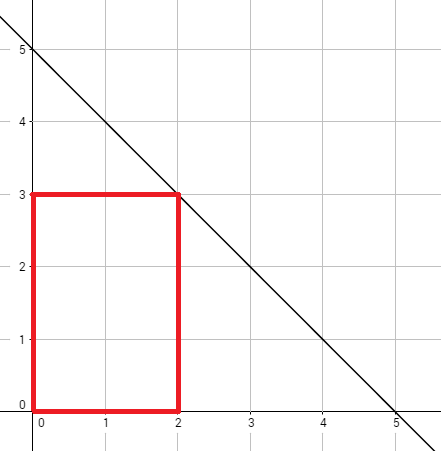CF821B-Okabe and Banana Trees
来源:互联网 发布:led蓝光危害 知乎 编辑:程序博客网 时间:2024/06/07 01:25
B. Okabe and Banana Trees
time limit per test2 seconds
memory limit per test256 megabytes
inputstandard input
outputstandard output
Okabe needs bananas for one of his experiments for some strange reason. So he decides to go to the forest and cut banana trees.
Consider the point (x, y) in the 2D plane such that x and y are integers and 0 ≤ x, y. There is a tree in such a point, and it has x + y bananas. There are no trees nor bananas in other points. Now, Okabe draws a line with equation . Okabe can select a single rectangle with axis aligned sides with all points on or under the line and cut all the trees in all points that are inside or on the border of this rectangle and take their bananas. Okabe’s rectangle can be degenerate; that is, it can be a line segment or even a point.
Help Okabe and find the maximum number of bananas he can get if he chooses the rectangle wisely.
Okabe is sure that the answer does not exceed 1018. You can trust him.
Input
The first line of input contains two space-separated integers m and b (1 ≤ m ≤ 1000, 1 ≤ b ≤ 10000).
Output
Print the maximum number of bananas Okabe can get from the trees he cuts.
Examples
input
1 5
output
30
input
2 3
output
25
Note 
The graph above corresponds to sample test 1. The optimal rectangle is shown in red and has 30 bananas.
题目大意:给你一条直线,在第一象限且在直线下画一个矩形,每个点(x,y)的香蕉数为x+y,矩形内包括边界上的香蕉可采,问最大香蕉数。
解题思路:按y讨论,香蕉数可用y计算得到,首先计算出最右边界,然后用等差数列求和导出香蕉总数公式,若不这样计算,会超时。
#include <iostream>using namespace std;typedef long long LL;int main(){ LL m,b; LL sum; LL ans; while(cin>>m>>b) { ans=0; for(int i=b;i>=0;i--) { sum=0; LL border=m*(b-i); sum=((border+1)*border/2)*(i+1)+(i*(i+1)/2)*(border+1); if(sum>ans) ans=sum; } cout<<ans<<endl; } return 0;}- CF821B-Okabe and Banana Trees
- Codeforces821B Okabe and Banana Trees
- Okabe and Banana Trees CodeForces
- Codeforces 821 B. Okabe and Banana Trees
- codeforces 821 B Okabe and Banana Trees
- Codeforces 821B-Okabe and Banana Trees
- Codeforces#420 Okabe and Banana Trees
- CF #420 B. Okabe and Banana Trees
- codeforces -420-B. Okabe and Banana Trees
- Okabe and Banana Trees 思路题
- #420 B. Okabe and Banana Trees(Div.2)
- Codeforces Round #420 (Div. 2) B. Okabe and Banana Trees
- Codeforces 821B Okabe and Banana Trees 题解
- Codefroces 821B Okabe and Banana Trees(暴力)
- Codeforces Round #420 B. Okabe and Banana Trees
- CF#420 B. Okabe and Banana Trees 思维|暴力|几何
- #420 Div.2 B. Okabe and Banana Trees——数学&暴力
- CF#420 Div.2 B. Okabe and Banana Trees(数学)
- 2017/6/26日总结
- nodejs--(1)
- servlet原理
- 作业6.26
- 2017.5.27测试 5. 扑克游戏
- CF821B-Okabe and Banana Trees
- Tablayout+viewpager
- HTML:js中Window对象的常用属性:screen对象
- 跟新数据库中某个字段的值,在某列后都加某个字符
- DataBase学习笔记 --- OLAP 与 OLTP区别
- java中String的getBytes的用法
- testng + mockito + powerMock
- python数据分析工具学习安装配置简介
- 打包H264码流到FLV文件——神文


